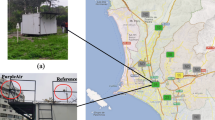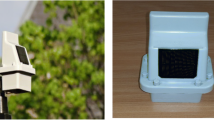Abstract
An effective micro-level air quality management plan requires high-resolution monitoring of pollutants. India has already developed a vast network of air quality monitoring stations, both manual and real time, located primarily in urban areas, including megacities. The air quality monitoring network consists of conventional manual stations and real time Continuous Ambient Air Quality Monitoring Stations (CAAQMS) which comprise state-of-the-art analysers and instruments. India is currently in the early stages of developing and adopting economical portable sensor (EPS) in air quality monitoring systems. Protocols need to be established for field calibration and testing. The present research work is an attempt to develop a performance-based assessment framework for the selection of EPS for air quality monitoring. The two-stage selection protocol includes a review of the factory calibration data and a comparison of EPS data with a reference monitor, i.e. a portable calibrated monitor and a CAAQMS. Methods deployed include calculation of central tendency, dispersion around a central value, calculation of statistical parameters for data comparison, and plotting pollution rose and diurnal profile (peak and non-peak pollution measurement). Four commercially available EPS were tested blind, out of which, data from EPS 2 (S2) and EPS 3 (S3) were closer to reference stations at both locations. The selection was made by evaluating monitoring results, physical features, measurement range, and frequency along with examining capital cost. This proposed approach can be used to increase the usability of EPS in the development of micro-level air quality management strategies, other than regulatory compliance. For regulatory compliance, additional research is needed, including field calibration and evaluating EPS performance through additional variables. This proposed framework may be used as starting point, for such experiments, in order to develop confidence in the use of EPS.








Similar content being viewed by others
Data availability
The datasets generated and analysed during the current study are available from the corresponding author on reasonable request.
References
Badura, M., Batog, P., Drzeniecka-Osiadacz, A., & Modzel, P. (2019). Regression methods in the calibration of low-cost sensors for ambient particulate matter measurements. SN Applied Sciences, 1(6), 1–11. https://doi.org/10.1007/s42452-019-0630-1
Bauerová, P., Šindelářová, A., Rychlík, Š., Novák, Z., & Keder, J. (2020). Low-cost air quality sensors: One-year field comparative measurement of different gas sensors and particle counters with reference monitors at Tušimice Observatory. Atmosphere 11.5(2020), 492. https://doi.org/10.3390/atmos11050492
Bittner, A. S., Cross, E. S., Hagan, D. H., Malings, C., Lipsky, E., & Grieshop, A. P. (2022). Performance characterization of low-cost air quality sensors for off-grid deployment in rural Malawi. Atmospheric Measurement Techniques, 15(11), 3353–3376. https://doi.org/10.5194/amt-15-3353-2022
Chambliss, S. E., Preble, C. V., Caubel, J. J., Cados, T., Messier, K. P., Alvarez, R. A., et al. (2020). Comparison of mobile and fixed-site black carbon measurements for high-resolution urban pollution mapping. Environmental Science and Technology, 54(13), 7848–7857. https://doi.org/10.1021/acs.est.0c01409
Chu, H. J., Ali, M. Z., & He, Y. C. (2020). Spatial calibration and PM2.5 mapping of low-cost air quality sensors. Scientific Reports, 10(1), 1–11. https://doi.org/10.1038/s41598-020-79064-w
Clements, A. L., Griswold, W. G., Abhijit, R. S., Johnston, J. E., Herting, M. M., Thorson, J., et al. (2017). Low-cost air quality monitoring tools: From research to practice (a workshop summary). Sensors (switzerland), 17(11), 1–20. https://doi.org/10.3390/s17112478
Concas, F., Lagerspetz, E., Varjonen, S., & Liu, X. (2021). Low-cost outdoor air quality monitoring and sensor calibration: A survey and critical analysis, (May). https://doi.org/10.1145/3446005
CPCB. (2013). Guidelines for real time sampling & analyses. National Ambient Air Quality Series:NAAQMS/36/2012–13. Vol - II. Central Pollution Control Board, Ministry of Environment, Forest and Climate Change. http://www.cpcb.nic.in
deSouza, P., Kahn, R., Stockman, T., Obermann, W., Crawford, B., Wang, A., et al. (2022). Calibrating networks of low-cost air quality sensors. Atmospheric Measurement Techniques Discussions, 2022(March), 1–34. https://amt.copernicus.org/preprints/amt-2022-65/. Accessed 4 June 2022.
Dey, S., Purohit, B., Balyan, P., Dixit, K., Bali, K., Kumar, A., & Shukla, V. K. (2020). A satellite-based high-resolution (1-km) ambient PM2. 5 database for India over two decades (2000–2019): Applications for air quality management. Remote Sensing, 12(23), 3872. https://doi.org/10.3390/rs12233872
Giordano, M. R., Malings, C., Pandis, S. N., Presto, A. A., McNeill, V. F., Westervelt, D. M., et al. (2021). From low-cost sensors to high-quality data: A summary of challenges and best practices for effectively calibrating low-cost particulate matter mass sensors. Journal of Aerosol Science, 158(January), 105833. https://doi.org/10.1016/j.jaerosci.2021.105833
Gonzalez, A., Boies, A., Swason, J., & Kittelson, D. (2019). Field calibration of low-cost air pollution sensors. Atmospheric Measurement Techniques Discussions, 2050(August), 1–17.
Goyal, P., Gulia, S., & Goyal, S. K. (2021). Identification of air pollution hotspots in urban areas - An innovative approach using monitored concentrations data. Science of the Total Environment, 798, 149143. https://doi.org/10.1016/j.scitotenv.2021.149143
GRIMM. (2022). 11-D. https://www.grimm-aerosol.com/products-en/environmental-dust-monitoring/handheld-pm-monitor/11-d/. Accessed 10 June 2022
Gulia, S., Prasad, P., Goyal, S. K., & Kumar, R. (2020). Sensor-based wireless air quality monitoring network (SWAQMN) - A smart tool for urban air quality management. Atmospheric Pollution Research, 11(9), 1588–1597. https://doi.org/10.1016/j.apr.2020.06.016
Gulia, S., Shukla, N., Padhi, L., Bosu, P., Goyal, S. K., & Kumar, R. (2022). Evolution of air pollution management policies and related research in India. Environmental Challenges, 6(July 2021), 100431. https://doi.org/10.1016/j.envc.2021.100431.
Hegde, S., Min, K. T., Moore, J., Lundrigan, P., Patwari, N., Collingwood, S., et al. (2020). Indoor household particulate matter measurements using a network of low-cost sensors. Aerosol and Air Quality Research, 20(2), 381–394. https://doi.org/10.4209/aaqr.2019.01.0046
Karagulian, F., Barbiere, M., Kotsev, A., Spinelle, L., Gerboles, M., & Lagler, F., et al. (2019). Review of the performance of low-cost sensors for air quality monitoring. Atmosphere, 10(9). https://doi.org/10.3390/atmos10090506.
Kelly, K. E., Whitaker, J., Petty, A., Widmer, C., Dybwad, A., Sleeth, D., et al. (2017). Ambient and laboratory evaluation of a low-cost particulate matter sensor. Environmental Pollution, 221, 491–500. https://doi.org/10.1016/j.envpol.2016.12.039
Kureshi, R. R., Mishra, B. K., Thakker, D., John, R., Walker, A., Simpson, S., et al. (2022). Data-driven techniques for low-cost sensor selection and calibration for the use case of air quality monitoring. Sensors, 22(3). https://doi.org/10.3390/s22031093.
Leung, D. Y. C. (2015). Outdoor-indoor air pollution in urban environment: Challenges and opportunity. Frontiers in Environmental Science, 2(JAN), 1–7. https://doi.org/10.3389/fenvs.2014.00069.
Levy Zamora, M., Xiong, F., Gentner, D., Kerkez, B., Kohrman-Glaser, J., & Koehler, K. (2019). Field and laboratory evaluations of the low-cost plantower particulate matter sensor. Environmental Science and Technology, 53(2), 838–849. https://doi.org/10.1021/acs.est.8b05174
Li, J., Mattewal, S. K., Patel, S., & Biswas, P. (2020). Evaluation of nine low-cost-sensor-based particulate matter monitors. Aerosol and Air Quality Research, 20(2), 254–270. https://doi.org/10.4209/aaqr.2018.12.0485
Liu, X., Jayaratne, R., Thai, P., Kuhn, T., Zing, I., Christensen, B., et al. (2020). Low-cost sensors as an alternative for long-term air quality monitoring. Environmental Research, 185(March), 109438. https://doi.org/10.1016/j.envres.2020.109438
Liu, B., Tan, X., Jin, Y., Yu, W., & Li, C. (2021). Application of RR-XGBoost combined model in data calibration of micro air quality detector. Scientific Reports, 11(1), 1–14. https://doi.org/10.1038/s41598-021-95027-1
MoEF&CC. (2019). National Clean Air Programme (NCAP). Central Pollution Control Board. Ministry of Environmental Forests and Climate Change, The Government of India.
Mukherjee, A., Stanton, L. G., Graham, A. R., & Roberts, P. T. (2017). Assessing the utility of low-cost particulate matter sensors over a 12-week period in the Cuyama valley of California. Sensors, 17(8), 1805.
Narayana, M. V., Jalihal, D., & Nagendra, S. M. S. (2022). Establishing a sustainable low-cost air quality monitoring setup: A survey of the state-of-the-art. Sensors, 22(1), 1–39. https://doi.org/10.3390/s22010394
Nguyen, N. H., Nguyen, H. X., Le, T. T. B., & Vu, C. D. (2021). Evaluating low-cost commercially available sensors for air quality monitoring and application of sensor calibration methods for improving accuracy. Open Journal of Air Pollution, 10(01), 1–17. https://doi.org/10.4236/ojap.2021.101001
Patra, S. S., Ramsisaria, R., Du, R., Wu, T., & Boor, B. E. (2021). A machine learning field calibration method for improving the performance of low-cost particle sensors. Building and Environment, 190, 19–25. https://doi.org/10.1016/j.buildenv.2020.107457
Prieto, W. H., & Cremasco, M. A. (2017). Application of probability density functions in modelling annual data of atmospheric NOx temporal concentration. Chemical Engineering Transactions, 57, 487–492. https://doi.org/10.3303/CET1757082
Simon, H., Baker, K. R., & Phillips, S. (2012). Compilation and interpretation of photochemical model performance statistics published between 2006 and 2012. Atmospheric Environment, 61, 124–139. https://doi.org/10.1016/j.atmosenv.2012.07.012
Singh, V., Singh, S., & Biswal, A. (2021). Exceedances and trends of particulate matter (PM2. 5) in five Indian megacities. Science of the Total Environment, 750, 141461. https://doi.org/10.1016/j.scitotenv.2020.141461
Song, J., Saathoff, H., Gao, L., Gebhardt, R., Jiang, F., Vallon, M., et al. (2022). Variations of PM2.5 sources in the context of meteorology and seasonality at an urban street canyon in Southwest Germany. Atmospheric Environment, 282(April), 119147. https://doi.org/10.1016/j.atmosenv.2022.119147
Spinelle, L., Gerboles, M., Villani, M. G., Aleixandre, M., & Bonavitacola, F. (2017). Field calibration of a cluster of low-cost commercially available sensors for air quality monitoring. Part B: NO, CO and CO2. Sensors and Actuators, b: Chemical, 238, 706–715. https://doi.org/10.1016/j.snb.2016.07.036
Srbinovska, M., Andova, V., Mateska, A. K., & Krstevska, M. C. (2021). The effect of small green walls on reduction of particulate matter concentration in open areas. Journal of Cleaner Production, 279, 123306. https://doi.org/10.1016/j.jclepro.2020.123306
Wang, Y., Du, Y., Wang, J., & Li, T. (2019). Calibration of a low-cost PM2.5 monitor using a random forest model. Environment International, 133(October), 105161. https://doi.org/10.1016/j.envint.2019.105161.
Zheng, T., Bergin, M. H., Johnson, K. K., Tripathi, S. N., Shirodkar, S., Landis, M. S., et al. (2018). Field evaluation of low-cost particulate matter sensors in high-and low-concentration environments. Atmospheric Measurement Techniques, 11(8), 4823–4846. https://doi.org/10.5194/amt-11-4823-2018
Zimmerman, N., Presto, A. A., Kumar, S. P. N., Gu, J., Hauryliuk, A., Robinson, E. S., et al. (2018). A machine learning calibration model using random forests to improve sensor performance for lower-cost air quality monitoring. Atmospheric Measurement Techniques, 11(1), 291–313. https://doi.org/10.5194/amt-11-291-2018
Zoest, V. V., Osei, F. B., Stein, A., & Hoek, G. (2019). Calibration of low-cost NO2 sensors in an urban air quality network. Atmospheric Environment, 210(2), 66–75. https://doi.org/10.1016/j.atmosenv.2019.04.048
Acknowledgements
Authors are acknowledging the Central Pollution Control Board for using air quality data of their station (available online in public domain) located at the Delhi Technological University (DTU) campus. The authors are also thankful to Dr Rajeev Mishra and his students at DTU for their logistical support during the monitoring period.
Funding
The present research work is part of the CSIR NEERI’s ongoing project, financially supported by the Environment Defense Fund, NY, USA. The members of EDF are also the authors of this manuscript.
Author information
Authors and Affiliations
Contributions
Nidhi Shukla: writing—original draft, monitoring, and data analysis, Sunil Gulia: conceptualization, methodology, editing of the draft version, supervision. Prachi Goyal: critical review and corrections. Swagata Dey: critical review and monitoring support. Parthaa Bosu: review and supervision. S.K. Goyal: critical review, visualisation, and supervision.
Corresponding author
Ethics declarations
Ethics approval
All authors have read, understood, and have complied as applicable with the statement on “Ethical responsibilities of Authors” as found in the Instructions for Authors and are aware that with minor exceptions, no changes can be made to authorship once the paper is submitted.
Conflict of interest
The authors declare no competing interests.
Additional information
Publisher's note
Springer Nature remains neutral with regard to jurisdictional claims in published maps and institutional affiliations.
Supplementary Information
Below is the link to the electronic supplementary material.
Rights and permissions
Springer Nature or its licensor (e.g. a society or other partner) holds exclusive rights to this article under a publishing agreement with the author(s) or other rightsholder(s); author self-archiving of the accepted manuscript version of this article is solely governed by the terms of such publishing agreement and applicable law.
About this article
Cite this article
Shukla, N., Gulia, S., Goyal, P. et al. Performance-based protocol for selection of economical portable sensor for air quality measurement. Environ Monit Assess 195, 845 (2023). https://doi.org/10.1007/s10661-023-11438-9
Received:
Accepted:
Published:
DOI: https://doi.org/10.1007/s10661-023-11438-9




